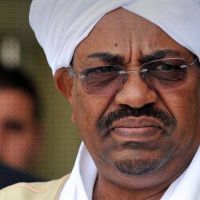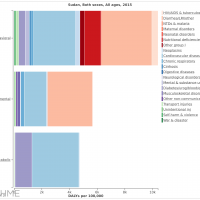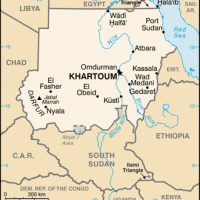|
|
|
|
Northern Sudan once had a significant Christian population, and for a thousand years, the majority in Sudan was Christian. Today, Sudan his a reputation for corruption, division and obscene violence. The jagged ethnic and geographic barriers decades in the making have contributed to challenges of the present. After gaining independence from the UK in 1956, differences between north and south led to civil wars and the eventual formation of South Sudan as a sovereign nation in July 2011. Though concessions have been reached between the north and south, Sudan remains a spiritual and physical battlefield, as Christians comprise only a small minority, with many finding it difficult to leave despite threatening language from the Islamist government.
Before South Sudan seceded, Sudan was torn in two by ethnic and religious differences. Though less in number, northern Arab Muslims controlled the government with little regard for the Sudanese majority who occupied the south. Civil wars and exploitation of southern oil fields led to retaliation of blacks in Darfur, western Sudan in 2004. Government forces responded harshly to the rebellion, displacing an estimated two million people and killing 200,000 to 400,000 more. Four tragic years later the UN became the leading force in peacekeeping operations and began the difficult task of restoring a society devastated by ethnic discrimination and displacement.
Today, the majority of Sudan's inhabitants are Arab Sunni Muslims. As the ruling majority, their influence over law and government is strong. Though a recent agreement provided protection for non-Arabs, conversion to Christianity is legally punishable by death. While their brothers and sisters in South Sudan live in relative freedom, believers in Sudan face strong persecution, with those in the Nuba Mountains facing the most severe. There is a great need for regional and denominational unity and the establishment of Christian communities throughout Sudan. Pray that Sudanese believers would remain faithful to Christ despite persecution and join together as a unified body of believers.
|
|
|
|
|
In addition to multiple civil wars over the past 65 years, there is an ongoing conflict in the Darfur region of western which has resulted in an estimated 178,000 to 461,000 deaths, with 80% of them being due to disease. Over one 18-month month period in 2004 the WHO estimated 50,000 deaths due to starvation. A militia group working with the Sudanese government has become notorious for its use of rape as a weapon of war, and at least 9,300 rapes have been documented, while in-country observers have testified that the actual number is closer to twice that, and that a third of the victims are children.
Omar Hassan al-Bashir has been called president since his military coup in 1989. Officially, the country is a constitutional republic with a two-party system and a bicameral legislature. In actual practice, it is presumed to be an Islamist authoritarian one-party state. All true power is wielded by al-Bashir and his National Islamic Front. al-Bashir is wanted by the International Criminal Court for war crimes and crimes against humanity: three counts of genocide against Darfur's ethnic groups.

Omar al-Bashir, president of Sudan since 1989.
US Election monitoring reviewed the 2010 elections as "highly chaotic, non-transparent and vulnerable to electoral manipulation."
Flogging, stoning and crucifixion are official forms of legal punishment in Sudan, and Christians are often the victims. Three of the four pastors detained on trumped up charges in 2015 remain in prison. Kuwa Shamal was released, but Hassan Tour, Abdulmonem Abdumawla and Petr Jašek (a worker from Czech Republic) remain in prison.
Christian ministries operating
|
|
|
|
|
|
Since South Sudan's independence, Sudan's economy has entered a state of "stagflation," with high unemployment, recession and inflation. This is partly due to the fact that the economy began improving dramatically after 2000 due to the industrialization of the oil industry, only to lose 80% of the operational oil fields when South Sudan became an independent nation.
Desertification from the north has made agriculture exceedingly difficult. Historically 80% of the people earn their living from farming, and it is a third of the economy. Although the "Global Hunger Index" score could not be calculated for Sudan in 2016 due to lack of data, it was set at "alarming hunger situation" in 2013 and ranked the 5th hungriest nation in the world.
Sudan also has one of the lowest Human Development Index numbers in the world at 167th place. Nearly 20% of the populace lives below the international poverty line. It also has been identified as one of the most corrupt nations in the world.

There were an estimated 2.8 physicians per 10,000 population in 2008, and life expectancy is about 64 years, while infant mortality is about 51 per 1,000 live births.

Sudan is a Malarial region, and other illnesses such as Yellow Fever and Schistosomiasis are common. Sudan is also bordered by seven countries in which HIV is prevalent, so it is susceptible to increases in this disease.

Sudan is bordered by Libya and Egypt to the North, Eritrea and Ethiopia to the East, the Central African Republic and South Sudan to the South, and Chad to the West.
|
|
|
|
|
GMO's Stats on Sudan
In FY2023 we had 305,910 gospel visits, 367 explorer visits and 121,610 indicated decisions from Sudan. We have no Online Missionaries in Sudan.
“We live in the tension of faith and suffering, even as we walk in the ‘already and the not yet’…. This faith offers us the option of continuing to trust God, even while we accept the limits of our humanity…” — Sudanese Pastor Isaiah Dau
|
|
|
|
|
|
Member Prayer Requests/Praise Report from last week
Yvonne: surgery, January 31. Pain is very distracting
Frank: praise - Martha recognized him during last visit
John: Mother-in-law Ife no longer goes to church regularly with them, but a family friend (Shelly) has been staying with her and conducts worship services with her. Passed away unexpectedly. Pray for her family
|
|